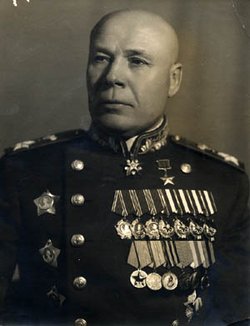Marshal of the Soviet Union
|
|
The rank of Marshal of the Soviet Union (Russian: Marshal Sovietskogo Soyuza, Маршал Совет́ского Союза) was in practice the highest military rank of the Soviet Union. (The highest rank in theory, Generalissimo of the Soviet Union, was created for Joseph Stalin and held by him alone). The rank of Marshal of the Soviet Union was created in 1935 and abolished in 1991. Forty-one people held the rank of Marshal of the Soviet Union. The equivalent naval rank was Admiral of the Fleet of the Soviet Union.
History of the rank
The military rank of Marshal of the Soviet Union was established by a decree of the Soviet Cabinet, the Council of People's Commissars (Sovnarkom), on September 22, 1935. On November 20 the rank was conferred on five people: People's Commissar of Defence and veteran Bolshevik Kliment Voroshilov, Chief of the General Staff of the Red Army Aleksandr Yegorov, and three senior commanders, Vasily Blyukher, Semyon Budyonny and Mikhail Tukhachevsky.
Of these, Blyukher, Tukhachevski and Yegorov were executed during Stalin's Great Purge of 1937-38. On May 7, 1940, three new Marshals were appointed: the new People's Commissar of Defence, Semyon Timoshenko, Boris Shaposhnikov, and Grigory Kulik.
During World War II Timoshenko and Budyonny were dismissed and Kulik was demoted for incompetence, and the rank of Marshal of the Soviet Union was given to a number of military commanders who earned it on merit. These included Georgy Zhukov, Ivan Koniev and Konstantin Rokossovsky. In 1943 Stalin himself was made a Marshal of the Soviet Union, and in 1945 he was joined by his police chief Lavrenti Beria. These "political" Marshals were joined in 1947 by Nikolai Bulganin.
Two Marshals were executed in postwar purges: Kulik in 1950 and Beria in 1953, following Stalin's death. Thereafter the rank was awarded only to professional soldiers, with the exception of Leonid Brezhnev, who made himself a Marshal in 1976. The last Marshal of the Soviet Union was Dmitry Yazov, appointed in 1990, who was imprisoned after the failed coup against Mikhail Gorbachev in 1991. Marshal Sergei Akhromeev committed suicide in 1991 on the fall of the Soviet Union. The rank was abolished with the dissolution of the Soviet Union in December 1991. It was succeeded by the rank of Marshal of the Russian Federation, which has been held by only one person, Marshal Igor Sergeyev who was Russian Defence Minister from 1997 to 2001 and is now security adviser to Russian President Vladimir Putin.
The marshals fell into three generational groups.
- Those who had gained their reputations during the Russian Civil War. These included both those who were purged in 1937-38 (Blyukher, Tukhachevsky and Yegorov), and those who held high commands in the early years of World War II (Budyonny, Kulik, Shaposhnikov, Timoshenko and Voroshilov). All these except Shaposhnikov proved incompetent and were removed from office.
- Those who made their reputations in World War II and assumed high commands in the latter part of the war. These included Zhukov, Vasilievsky, Koniev, Rokossovsky, Malinovsky, Tolbukhin and Chuikov.
- Those who assumed high command in the Cold War era. All of these were officers in World War II, but their higher commands were held in the Warsaw Pact or as Soviet Defence Ministers. These included Grechko, Yakubovsky, Ustinov, Kulikov, Ogarkov, Akhromeev and Yazov.
All the postwar Marshals had been officers in World War II, except Brezhnev who had been a military commissar. Even Yazov, who was 20 when the war ended, had been a platoon commander. Unlike senior U.S. commanders in the Cold War era, however, no Soviet Marshal had combat command experience after 1945. The persistence of World War II veterans in the Soviet military leadership was one factor in the decline of Soviet military capacity in the later Soviet period.
List of Marshals of the Soviet Union
- Kliment Voroshilov (1881-1969), appointed November 1935
- Mikhail Tukhachevsky (1893-1937), appointed November 1935
- Aleksandr Yegorov (1883-1939), appointed November 1935
- Semyon Budyonny (1883-1973), appointed November 1935
- Vasily Blyukher (1890-1938), appointed November 1935
- Semyon Timoshenko (1895-1970), appointed May 1940
- Grigory Kulik (1890-1950), appointed May 1940
- Boris Shaposhnikov (1882-1945), appointed May 1940
- Georgy Zhukov (1896-1974), appointed January 1943
- Aleksandr Vasilevsky (1895-1977), appointed February 1943
- Joseph Stalin (1879-1953), appointed March 1943
- Ivan Koniev (1897-1973), appointed February 1944
- Leonid Govorov (1897-1955), appointed June 1944
- Konstantin Rokossovsky (1896-1968), appointed June 1944 (As Konstanty Rokossowski he was also a Marshall of Poland from 1949)
- Rodion Malinovsky (1898-1967), appointed September 1944
- Fedor Tolbukhin (1894-1949), appointed September 1944
- Kirill Meretskov (1897-1968), appointed October 1944
- Lavrenty Beria (1899-1953), appointed July 1945
- Vasily Sokolovsky (1897-1968), appointed July 1946
- Nikolai Bulganin (1895-1975), appointed November 1947
- Ivan Bagramian (1897-1982), appointed March 1955
- Sergei Biriuzov (1904-64), appointed March 1955
- Andrei Grechko (1903-76), appointed March 1955
- Andrei Yeremenko (1892-1970), appointed March 1955
- Kirill Moskalenko (1902-85), appointed March 1955
- Vasily Chuikov (1900-82), appointed March 1955
- Matvei Zakharov (1898-1972), appointed May 1959
- Filipp Golikov (1900-80), appointed May 1961
- Nikolai Krylov (1903-72), appointed May 1962
- Ivan Yakubovsky (1912-76), appointed April 1967
- Pavel Batitsky (1910-84), appointed April 1968
- Petr Koshevoi (1904-76), appointed April 1968
- Leonid Brezhnev (1906-82), appointed May 1976
- Dmitry Ustinov (1908-84), appointed July 1976
- Viktor Kulikov (born 1921), appointed January 1977
- Nikolai Ogarkov (1917-94), appointed January 1977
- Sergei Sokolov (born 1911), appointed February 1978
- Sergei Akhromeev (1923-91), appointed March 1983
- Semyon Kurkotkin (1917-90), appointed March 1983
- Vasily Petrov (born 1917), appointed March 1983
- Dmitry Yazov (born 1924), appointed April 1990ru: Маршал Советского Союза

